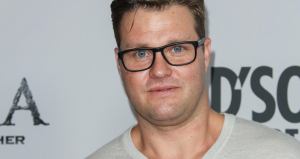Charles Manson’s grandson says that he regrets never meeting his grandfather in the flesh — and hopes it’s not too late to claim his remains.
“I’m going to move towards having a proper burial,” Jason Freeman, 41, told the New York Daily News on Monday, a day after the cult leader died at the age of 83.
Videos by PopCulture.com
“I will definitely speak with the inner circle of people who love my grandfather and who may know more of where he would want to be. I’m working on doing my part,” Freeman said.
Manson’s remains are currently being held at Corcoran State Prison in California, where they will remain until someone claims them or for ten days. At that point, if no one has claimed his body, the prison will inter his body with state resources or with any funds he held. The state would also obtain any property Manson left behind.
If Manson legally designated someone for death notification, prison staff will attempt to reach that person with a visit, telephone call or telegram, in accordance with state regulations.
Manson might even get a ceremony if he designated one in a will.
“A chaplain of the decedent’s professed faith may perform a ceremony in accordance with that faith,” the California Code of Regulations governing inmate death states.
Freeman first stepped forward in 2012 and said he barely knew his own father, who was the only son of Manson and his first wife, Rosalie.
Born Charles Manson Jr., the estranged dad changed his name to Jay White after his mom divorced the future mass murderer. White eventually died by suicide in June 1993 while in his late 30s.
Freeman said he blamed his father’s death on his grandfather until he began speaking with Manson by phone eight years ago and reached a place of “forgiveness.”
Manson’s grandson lobbied for the right to visit Manson at Corcoran State Prison but never succeeded. Asked why a meeting never took place, he suggested Manson himself never gave the green light.
“I get emotional (talking about this),” Freeman said. “Some stuff is frustrating. He wanted to protect me, keep me out of all the pressure and hatred the world has.”
He said he regrets waiting so long to reach out to his estranged grandfather.
“It’s weighing on my shoulders. I should have been faster, should have done more, should have done something different. It’s like I was trying too hard at the end of the marathon and now the marathon is over. That’s what it feels like,” he said. “I don’t want to say I feel defeated, but I feel beat up right now.”
Manson died of “natural causes” while serving nine concurrent life sentences for murder. He had reportedly been extremely reclusive for the past few years and had been hospitalized twice in the past year.
While this cause of death leaves room for interpretation, it simply means he wasn’t killed by anything other than disease or the natural aging process. In other words, Manson was not murdered, nor did he overdose on drugs or alcohol, nor did he die by suicide.
He did not attend his parole hearing in 2012, and the lawyer representing him at that trial had never even met Manson.
CNN reports that Manson’s mental health was unstable throughout his more than 40-year prison stint.
A member of his two-person parole board said that Manson had a catalogue of problems with his mental health, among them “schizophrenia” and “a paranoid delusional disorder.” He added that Manson also had a history of using drugs like LSD, amphetamines and barbiturates.
Considered an extremely dangerous individual outside prison walls, Manson was monitored by uniformed guards 24/7. During his time in prison, he earned more than 100 infractions for offenses including threatening prison staff, possession of a weapon, assault, failing to provide a urine sample for random drug testing and getting caught with contraband mobile phones.








